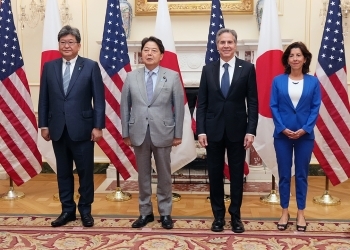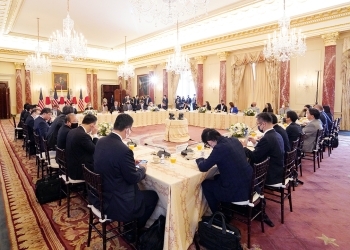Japan-United States of America Relations
Japan-U.S. Economic Policy Consultative Committee Meeting (the Economic "2+2")
July 29, 2022


The Japan-U.S. Economic Policy Consultative Committee (the Economic "2+2") was held for about 130 minutes from 9:06 am (local time) on July 29, 2022 (22:06 Japan time). The meeting was attended by Minister for Foreign Affairs HAYASHI Yoshimasa and Minister of Economy, Trade and Industry HAGIUDA Koichi (from the Japanese side), as well as The Honorable Antony Blinken, Secretary of State of the United States of America, and The Honorable Gina Raimondo, Secretary of Commerce of the United States of America(from the U.S. side). The overview of the meeting is as follows. A joint statement (PDF) was issued after the meeting.
was issued after the meeting.
- At the beginning of the meeting, Secretary Blinken and Secretary Raimondo expressed their condolences for the passing of former Prime Minister Abe, while Minister Hayashi and Minister Hagiuda expressed their appreciation for the condolences from President Biden and many other U.S. government officials. Minister Hayashi stated that the Economic “2+2”, in which diplomacy, security, and the economy are discussed as one, is a framework that responds to the demands of our time, and that Japan and the United States intend to exercise leadership to maintain and strengthen the free and open rules-based international economic order as well as sustainable and inclusive economic growth. Minister Hagiuda stated that this framework, in which Japan and the U.S. will together confront challenges, such as countering attempts to use economic power for self-serving interests as well as the orderly development and use of cutting-edge technologies, and build an economic order will serve as “a compass for the realization of a free and open Indo-Pacific”.
- The Ministers shared a recognition that while the world is still recovering from the outbreak of the spread of the novel coronavirus which caused supply chain disruptions, price hikes and widening inequality, Russia’s aggression against Ukraine has exacerbated the situation and further threatened global energy and food security. In addition to the importance of strengthening supply chain resilience, fostering and protecting critical emerging technologies, and ensuring stable energy supplies, the four Ministers also recognized that the existing international order is being challenged not only by unilateral attempts to change the status quo by force, but also by attempts to realize their own strategic interests through the unfair and opaque use of economic influence. The Ministers concurred to discuss diplomacy, security and economy as one, and for Japan and the U.S. to lead cooperation in the international community.
- The four Ministers discussed (1) Realizing Peace and Prosperity through the Rules-Based Economic Order, (2) Countering Economic Coercion and Unfair and Opaque Lending Practices, (3) Promoting and Securing Critical and Emerging Technologies and Critical Infrastructure, and (4) Strengthening Supply Chain Resilience.
- (1) Realizing Peace and Prosperity through the Rules-Based Economic Order
At the start, Minister Hayashi stated the importance of Japan and the U.S. working together with like-minded countries to maintain and develop the international order as well as to ensure the economic security of each country, given the strong influence of economic matters on diplomacy and security today. Minister Hayashi and Minister Hagiuda also expressed Japan's support for and cooperation with the U.S.’s Indo-Pacific Economic Framework (IPEF), and their high expectations for the early return of the U.S. to the TPP and also stressed the need to strengthen cooperation in the areas of digital economy and human rights. The four Ministers also concurred on the importance of ensuring energy security and food security, and discussed cooperation for countries severely affected by Russia's aggression against Ukraine. - (2) Countering Economic Coercion and Unfair and Opaque Lending Practices
First, Secretary Blinken expressed opposition to uses of economic influence in ways that attempt to influence countries, including economic coercion as well as unfair and opaque lending practices, and proposed the need for cooperation not only between Japan and the U.S., but with the international community as a whole. In addition to discussing responses to these practices, the four Ministers shared the recognition that these are challenges to the free and open rules-based international order, and affirmed the importance of working together with many like-minded countries. On unfair and opaque development finance, they also concurred to work together to ensure that all relevant countries adhere to international rules and standards on unfair and opaque development finance. In addition, Minister Hayashi and Minister Hagiuda expressed that they would like to deepen discussions on economic coercion, which was also discussed at the G7 Elmau Summit, in the run-up to the G7 Hiroshima Summit next year. - (3) Promoting and Securing Critical and Emerging Technologies and Critical Infrastructure
First, Minister Hagiuda emphasized the importance of Japan-U.S. joint R&D on critical and emerging technologies, including semiconductors, and introduced the plan to establish a new R&D institution involving research and academic institutions, especially for the development of next-generation semiconductor technologies, and called for the participation of U.S. institutions. In addition, regarding the expansion of reliable information and telecommunications infrastructure, including deployment in third party countries, Japan and the U.S. concurred to cooperate to significantly increase the 5G international market share of open RANs. They also raised the importance of Japan and the U.S., which share common values, working together to strengthen economic security in these and other areas, and the four Ministers concurred to promote cooperation not only between Japan and the U.S., but also with like-minded countries. Minister Hayashi and Minister Hagiuda also proposed Japan-U.S. cooperation in sharing information on threats to critical infrastructure. - (4) Strengthening Supply Chain Resilience
First, Secretary Raimondo proposed the need to concretely pursue Japan-U.S. cooperation on export controls and also proposed Japan-U.S. cooperation on strengthening semiconductor supply chain resilience. The four Ministers concurred on the need to build more resilient supply chains based on a rules-based multilateral free trade regime and in cooperation with like-minded countries. Minister Hayashi and Minister Hagiuda congratulated the U.S. on the success of the recent "Supply Chain Ministerial Meeting" hosted by the U.S., and proposed Japan-U.S. cooperation in areas such as semiconductors, storage batteries, and critical minerals.
- The Ministers reaffirmed the need for Japan and the U.S. to remain the greatest advocates of a free and open rules-based international economic order, and reaffirmed their determination to lead international cooperation in areas such as economic policy of both countries, the establishment of a regional economic order including in the Indo-Pacific region, and economic security. The Ministers concurred to promote cooperation based on the U.S.-Japan Competitiveness and Resilience (CoRe) Partnership agreed in April 2021, and as well as to deepen discussions and cooperation in related fields with like-minded countries, including at the G7, which Japan will assume the presidency and at APEC, which the U.S. will chair next year. Finally, the Ministers also concurred to follow up in further detail at the Vice-Ministerial meeting and to hold the Economic “2+2” periodically.

